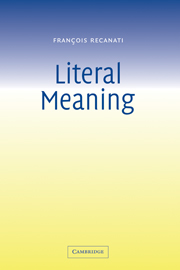Book contents
- Frontmatter
- Contents
- Acknowledgments
- Introduction
- 1 Two approaches to ‘what is said’
- 2 Primary pragmatic processes
- 3 Relevance-theoretic objections
- 4 The Syncretic View
- 5 Non-literal uses
- 6 From Literalism to Contextualism
- 7 Indexicalism and the Binding Fallacy
- 8 Circumstances of evaluation
- 9 Contextualism: how far can we go?
- Conclusion
- Bibliography
- Index
2 - Primary pragmatic processes
Published online by Cambridge University Press: 08 January 2010
- Frontmatter
- Contents
- Acknowledgments
- Introduction
- 1 Two approaches to ‘what is said’
- 2 Primary pragmatic processes
- 3 Relevance-theoretic objections
- 4 The Syncretic View
- 5 Non-literal uses
- 6 From Literalism to Contextualism
- 7 Indexicalism and the Binding Fallacy
- 8 Circumstances of evaluation
- 9 Contextualism: how far can we go?
- Conclusion
- Bibliography
- Index
Summary
Enrichment, loosening and transfer
Secondary pragmatic processes are ‘post-propositional’. They cannot take place unless some proposition p is considered as having been expressed, for they proceed by inferentially deriving some further proposition q (the implicature) from the fact that p has been expressed. In contrast, primary pragmatic processes are ‘pre-propositional’: they do not presuppose the prior identification of some proposition serving as input to the process. Another difference is the fact that secondary pragmatic processes are conscious in the sense that normal interpreters are aware both of what is said and of what is implied and are capable of working out the inferential connection between them. Primary pragmatic processes are not conscious in that sense. Normal interpreters need not be aware of the context-independent meanings of the expressions used, nor of the processes through which those meanings are enriched or otherwise adjusted to fit the situation of use. Unless they are linguists or would-be linguists, they are aware only of the output of the primary processes involved in contextual adjustment.
Saturation is a primary pragmatic process. If the uttered sentence is ‘She is smaller than John's sister’, then in order to work out what is said I must (at least) determine to whom the speaker refers by the pronoun ‘she’ and what the relevant relation is between John and the mentioned sister. Were saturation a secondary pragmatic process, I would have to proceed in reverse order, that is, to identify what is said in order to determine those things.
- Type
- Chapter
- Information
- Literal Meaning , pp. 23 - 37Publisher: Cambridge University PressPrint publication year: 2003



